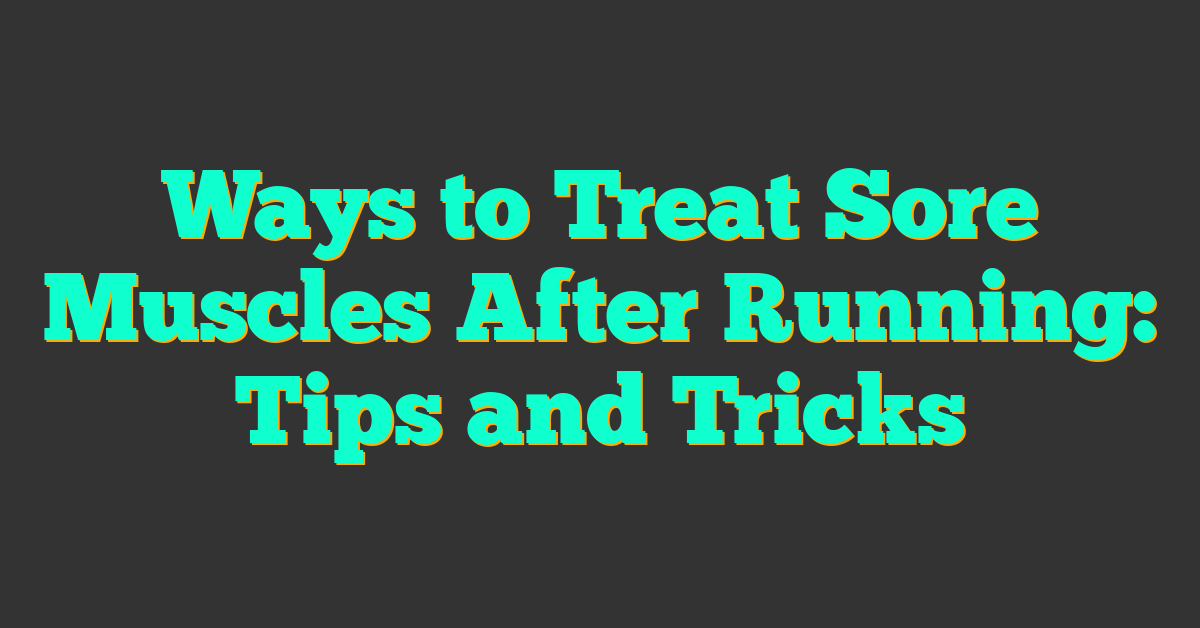If you’re a runner, you’ve probably experienced muscle soreness after a long run or a tough workout. While muscle soreness is a common occurrence, it can be uncomfortable and hinder your performance. Fortunately, there are several ways to treat sore muscles after running and speed up your recovery.

Understanding Muscle Soreness and Recovery is crucial to developing an effective recovery plan. Muscle soreness is a result of microscopic tears in muscle fibers that occur when you put your muscles under stress. Recovery is the process of repairing these tears and rebuilding muscle tissue to become stronger. By understanding the mechanisms behind muscle soreness and recovery, you can develop a recovery plan that targets the root cause of your soreness.
Immediate Post-Run Treatments can help alleviate muscle soreness and speed up recovery. Techniques like stretching, foam rolling, and ice baths can reduce inflammation and promote blood flow to the affected muscles. Additionally, proper hydration and nutrition can help replenish fluids and nutrients lost during exercise. By incorporating these treatments into your post-run routine, you can reduce muscle soreness and improve your recovery time.
Key Takeaways
- Understanding the causes of muscle soreness and recovery is crucial to developing an effective recovery plan.
- Immediate post-run treatments like stretching, foam rolling, and ice baths can help alleviate muscle soreness and speed up recovery.
- Long-term muscle care, advanced recovery techniques, and prevention and monitoring of muscle health are also important for reducing muscle soreness and improving performance.
Understanding Muscle Soreness and Recovery
https://www.youtube.com/watch?v=INOlxY7lpGs&embed=true

If you are a runner, you have probably experienced muscle soreness after a long run. Muscle soreness is a common occurrence in athletes and can be caused by a variety of factors. Understanding the cause of muscle soreness and the recovery process can help you prevent future injuries and improve your overall performance.
Types of Muscle Soreness
There are two types of muscle soreness: acute and delayed onset muscle soreness (DOMS). Acute muscle soreness is the pain and stiffness you feel immediately after a workout. This type of soreness is caused by the buildup of lactic acid in the muscles and usually goes away within a few hours.
DOMS, on the other hand, is the pain and stiffness you feel 24-48 hours after a workout. DOMS is caused by microscopic tears in the muscle fibers and inflammation. This type of soreness can last for several days and can be quite painful.
The Role of Recovery
Recovery is an essential part of any workout routine. Active recovery, such as light jogging or stretching, can help reduce muscle soreness and inflammation. It is also important to rest and allow your muscles time to recover.
In addition to active recovery and rest, proper nutrition can also play a role in the recovery process. Consuming a diet rich in carbohydrates and protein can help replenish glycogen stores and aid in muscle repair.
In summary, understanding the types of muscle soreness and the recovery process can help you prevent future injuries and improve your overall performance. Incorporating active recovery, rest, and proper nutrition into your routine can help reduce muscle soreness and aid in the recovery process.
Immediate Post-Run Treatments
https://www.youtube.com/watch?v=bKLn7xp-q48&embed=true
Running can be an excellent way to stay fit, but it can also lead to sore muscles. If you experience muscle soreness after running, there are several things you can do to alleviate the discomfort. Here are some immediate post-run treatments that you can try:
Cool Down and Stretching
One of the best things you can do after running is to cool down and stretch. This helps to increase blood flow to your muscles, which can help to reduce soreness and stiffness. Take a few minutes to walk or jog at a slow pace, then stretch your major muscle groups, such as your hamstrings, quadriceps, and calves. Hold each stretch for 15-30 seconds and repeat 2-3 times.
Hydration and Nutrition
Drinking water and eating nutritious foods after running can also help to reduce muscle soreness. Make sure to drink plenty of water to stay hydrated, especially if you sweat a lot during your run. Consuming carbohydrates and protein after running can also help to replenish energy and promote muscle recovery. Some good post-run snacks include chocolate milk, a banana with peanut butter, or a bagel with cream cheese.
Cold Therapy
Cold therapy can help to reduce inflammation and soreness in your muscles. You can try taking an ice bath or using an ice pack on sore areas. If you take an ice bath, fill a tub with cold water and add ice cubes. Sit in the tub for 10-15 minutes. If you use an ice pack, wrap it in a towel and apply it to sore areas for 15-20 minutes at a time.
By following these immediate post-run treatments, you can help to reduce muscle soreness and recover faster. Remember to listen to your body and take rest days when needed.
Long-Term Muscle Care
https://www.youtube.com/watch?v=Mv_dF2Y5TBk&embed=true
Sore muscles after running can be a common occurrence, but with proper care, you can prevent it from becoming a recurring problem. In addition to the tips for immediate relief, there are also long-term muscle care practices that can help you avoid soreness altogether.
Regular Massage and Foam Rolling
Regular massage and foam rolling can help prevent sore muscles by increasing blood flow and reducing muscle tension. Massage can be done by a professional or self-massage with a foam roller. Foam rolling is a form of self-myofascial release that can help break up knots and tightness in the muscles. It’s important to note that while foam rolling can be beneficial, it should not replace professional massage entirely.
Balanced Exercise Routine
A balanced exercise routine that includes cross-training, strength training, and active recovery can help prevent muscle soreness after running. Cross-training can help improve cardiovascular fitness and reduce the risk of injury. Strength training can help build muscle and improve overall body mechanics. Active recovery, such as light jogging or walking, can help increase blood flow and reduce muscle stiffness.
Adequate Rest Days and Sleep
Rest days are just as important as workout days. Adequate rest allows your muscles to recover and repair themselves, reducing the risk of soreness. It’s also important to get enough sleep each night. Sleep is when your body repairs and regenerates, and lack of sleep can lead to muscle soreness.
Incorporating these long-term muscle care practices into your routine can help prevent sore muscles after running and improve your overall athletic performance. Remember to listen to your body and adjust your routine as needed.
Advanced Recovery Techniques
« Ways to Become a Morning Runner: Tips and Tricks for Starting Your Day with a Run
Why It’s Important: What Activities to Do After Swimming »
https://www.youtube.com/watch?v=HBCfD7YQ9ic&embed=true
If you’re looking for more advanced recovery techniques to help soothe sore muscles after running, here are some options to consider:
Heat Therapy
Heat therapy can help increase blood flow and loosen up tight muscles. You can apply heat to sore areas using a heating pad, hot water bottle, or warm towel. Alternatively, you can take a warm bath or shower. Adding Epsom salts to your bath can also help soothe sore muscles, as they contain magnesium, which can help reduce inflammation and improve muscle function.
Professional Physical Therapy
If your soreness is severe or chronic, you may want to consider seeing a professional physical therapist. They can perform a variety of techniques, such as massage, stretching, and exercise, to help alleviate your pain and prevent future injuries.
Alternative Recovery Methods
There are several alternative recovery methods you can try, such as cryotherapy, yoga, and topical creams. Cryotherapy involves exposing your body to extreme cold temperatures, which can help reduce inflammation and promote healing. Yoga can help improve flexibility and reduce stress, which can help prevent muscle soreness. Topical creams containing anti-inflammatory properties, such as menthol or arnica, can also help soothe sore muscles.
Remember, while these advanced recovery techniques can be helpful, it’s important to listen to your body and not push yourself too hard. If your soreness persists or worsens, be sure to consult with a healthcare professional.
Prevention and Monitoring of Muscle Health
https://www.youtube.com/watch?v=UflC4NyBvH4&embed=true
As a runner, taking care of your muscles is essential for preventing injuries and achieving your running goals. Here are some tips to help you keep your muscles healthy and prevent soreness after running.
Pre-Run Preparation
One of the best ways to prevent muscle soreness after running is to properly warm up before you start. A good warm-up routine can help increase blood flow to your muscles, making them more flexible and less prone to injury. You can start with some light jogging or walking, followed by some dynamic stretching exercises like leg swings, lunges, and high knees.
Listening to Your Body
It’s important to listen to your body and pay attention to any signs of muscle soreness or injury. If you feel any pain or discomfort during your run, slow down or stop and take a break. Ignoring the pain can lead to more serious injuries like stress fractures, Achilles tendonitis, or plantar fasciitis.
When to Seek Medical Attention
If you experience persistent muscle soreness or pain that doesn’t go away after a few days of rest, it’s important to seek medical attention. Your doctor can help diagnose any underlying conditions that may be causing your muscle soreness and recommend appropriate treatment options.
In addition to these tips, there are other things you can do to prevent muscle soreness after running. These include:
- Staying hydrated before, during, and after your run.
- Eating a balanced diet rich in protein and carbohydrates to help your muscles recover.
- Getting enough rest and sleep to allow your muscles to recover and repair.
By following these tips, you can help prevent muscle soreness and injuries, and keep your muscles healthy and strong for your next run.
Frequently Asked Questions
https://www.youtube.com/watch?v=zcCgXB1LQ_w&embed=true
What are the best methods to relieve muscle soreness after a workout?
If you’re experiencing muscle soreness after running or working out, there are several methods you can try to relieve the pain. Stretching, foam rolling, and using a heating pad or ice pack are all effective ways to alleviate muscle soreness. Additionally, taking a warm bath or using Epsom salt can help relax your muscles and reduce soreness. Make sure to stay hydrated and get enough rest to help your muscles recover.
Can I continue to run or workout with sore muscles?
It’s generally safe to continue running or working out with sore muscles, but it’s important to listen to your body and not push yourself too hard. If your muscles are extremely sore, consider taking a break or doing a lighter workout until the soreness subsides. Continuing to exercise with sore muscles can increase your risk of injury and prolong the recovery process.
What are effective ways to treat thigh muscle pain from running?
Thigh muscle pain is a common issue among runners. To treat this type of muscle soreness, try using a foam roller or massage ball to target the affected area. Stretching your thighs before and after running can also help prevent muscle pain. If the pain is severe, consider taking a break from running or doing a lighter workout until the soreness subsides.
How can I speed up muscle recovery post-run?
To speed up muscle recovery after running, make sure to properly stretch and cool down after your workout. Additionally, getting enough rest and staying hydrated can help your muscles recover more quickly. Eating a balanced diet with enough protein can also help repair damaged muscle tissue.
What should I do if my whole body is sore after running?
If your whole body is sore after running, consider taking a break from exercise for a few days to give your muscles time to recover. During this time, focus on stretching, foam rolling, and getting enough rest. If the soreness persists, consider seeing a healthcare professional.
Are there any quick remedies for extreme muscle soreness following a workout?
While there are no quick fixes for extreme muscle soreness, there are some remedies that can help alleviate the pain. Taking a warm bath or using a heating pad can help relax your muscles and reduce soreness. Additionally, using an ice pack or taking an anti-inflammatory medication can help reduce swelling and pain. However, it’s important to consult with a healthcare professional before taking any medication.










